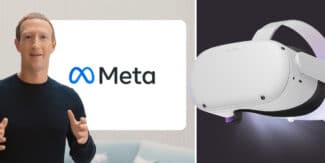Meta CEO Mark Zuckerberg gave insight into the company’s current and future hardware business model at Connect 2021, indicating that the plan is to continue to sell devices at cost or with subsidies to help build a larger ecosystem with as many users as possible.
The Quest 2 starts at just $299 despite having a higher resolution, more features, and less weight than its predecessor. That entry level price, however, may just be the start for Meta’s long-term ambitions.
Back in March, Zuckerberg confirmed that the company’s business model for headsets was focused on offering a low price above everything else.
Last week at Connect 2021, Zuckerberg gave further details about Meta’s commitment to this model, now and going forward. You can read a transcription below or watch from the 43:15 mark on the video embedded above.
Most of all, I’ve come to believe that the lack of choice and high fees are stifling innovation, stopping people from building new things and holding back the entire internet economy. We’ve tried to take a different approach. We want to serve as many people as possible, which means working to make our services cost less. not more.
Our mobile apps are free. Our ads’ business model is an auction, which guarantees every business the most competitive price possible. We offer our creator and commerce tools either at cost or with modest fees to enable as much creation and commerce as possible.
And it’s worked. Billions of people love our products. We have hundreds of millions of businesses on our platform, and we have a rapidly growing ecosystem and a thriving business.
That’s the approach that we want to take to help build the metaverse too. We plan to continue to either subsidize our devices or sell them at cost to make them available to more people. We’ll continue supporting sideloading and linking to PCs, so consumers and developers have choice rather than forcing them to use the Quest Store to find apps or reach customers. And we’ll aim to offer developer and creator services with low fees in as many cases as possible. So we can maximize the overall creator economy, while recognizing that to keep investing in this future we’ll need to keep some fees higher for some period to make sure that we don’t lose too much money on this program overall.
After all, while a growing number of developers are already profitable, we expect to invest many billions of dollars for years to come before the metaverse reaches scale. Our hope though is that if we all work at it then within the next decade, the metaverse will reach a billion people, host hundreds of billions of dollars of digital commerce and support jobs for millions of creators.
You can read more about what Meta executives had to say about the metaverse last week, or check out our round-up of everything announced at Connect 2021.




